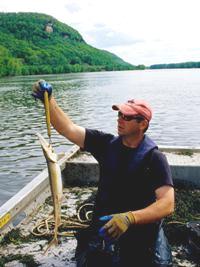Mississippi River
Fishing Wisconsin
The Upper Mississippi River is home to over 119 species of fish - more species than are found in any of Wisconsin’s inland lakes. Favorite sport fish include walleye, sauger, largemouth bass, smallmouth bass, channel catfish, northern pike, bluegill, and crappies. On the Mississippi River, you don't necessarily need a boat to catch them! The species list also includes riverine species such as catfish, blue sucker, shorthead redhorse, and bigmouth buffalo that are typical of large rivers in Wisconsin as well as some ancient fish such as paddlefish, lake sturgeon and shovelnose sturgeon.
Management of Mississippi River fisheries
Management of the Mississippi River’s natural resources is often accomplished through interagency cooperation, especially since there are often overlapping and shared responsibilities and authorities for fish and wildlife resources. While much of the Mississippi River that borders Wisconsin is part of the Upper Mississippi River National Wildlife and Fish Refuge, Wisconsin retained title to, custody and protection of the fishery in the river and adjacent waters.
Survey results and reports
Wisconsin fishery biologists conduct fish and habitat surveys on several navigation pools of the Mississippi River. The final reports, when available, are online at Fish and Habitat Survey Reports. The reports are categorized on a county basis as follows: Pool 7 - La Crosse County, Pool 8 - La Crosse and Vernon County, Pool 9 - Vernon and Crawford County, and Pool 10 - Grant County.
Mississippi River fishing information
Although the Mississippi River can be intimidating for anglers, its mix of backwater lakes, running sloughs, tailwaters and main channel habitats offer spectacular fishing opportunities.
For more detailed information on fishing on the Mississippi River including maps, safety tips for boating, and river habitats for fish see the Fishing and Boating on the Mississippi River guide available at the Wisconsin DNR - La Crosse Service Center.
Special rules, regulations and agreements apply when fishing the Upper Mississippi River. Reciprocity agreements between Wisconsin and the states of Iowa and Minnesota allow a person to fish the boundary waters on the Mississippi River providing they have a valid fishing license from one of the adjacent states. The boundary waters area is defined by the railroad tracks that parallel both sides of the river. However, residents must possess a resident license when fishing in their own state's boundary waters. Regulations between Wisconsin and the other states differ so anglers must obey the regulations in the state they are fishing.
Fish consumption advisories on the Mississippi River
For public health protection, the Department of Natural Resource routinely monitors chemicals in fish collected from waters throughout Wisconsin. After consulting with the Division of Health the state issues fish contaminant advisories yearly. Precautions recommended in the advisories range from advice that you remove fat and skin before cooking and eating some fish to a stronger statement that advises that you should not eat certain fish. You may also want to consult the fish consumption advisories from Iowa and Minnesota which also border the Mississippi River.
Fish consumption advisories
Fishing tournament information
Fishing tournaments have become popular on the Mississippi River from local ice fishing derbies to B.A.S.S.The tournament regulations and permit application process are now available online.
More fishing resources
- For anglers looking for more information, and locations to fish in counties bordering the Mississippi River check out WI DNR fishery areas. Fishery and Stream Bank Protection areas along streams, rivers, and lakes protect water quality by reducing erosion and run-off and improving habitat and fishing opportunities. This site provides maps, activities and contacts.
- Learn to identify Wisconsin Fishes with the Fish Identification Database.
- Wisconsin Fishing Regulations.
- See the DNR Managed Lands Site to find easements and wildlife areas for fishing and other recreational opportunities.

